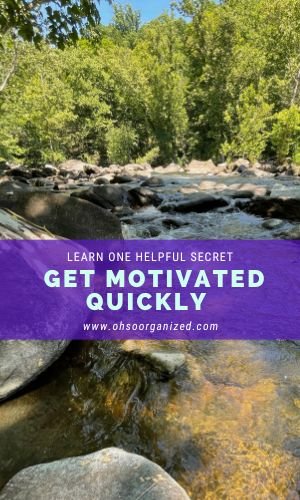When you think of mindfulness, what are your thoughts? Do you think about the formal practice of mindfulness meditation? Are you conjuring up images of breathing slowly or being still? Do you think about mindfulness as being present and aware of something like slowly sipping a hot cup of tea or watching the fall leaves gracefully float to the ground? There are formal mindfulness meditation practices and informal ways to incorporate living mindfully.
For today, I’m going to focus on the mindfully living aspect. I recently discussed the joy stretch with one of my organizing clients. This ‘stretch’ extends the experience of joy-filled moments through mindful awareness. Most mindfulness definitions include present or presence. However, the joy stretch consists of the past, present, and future. You bring conscious awareness to positive thoughts about the future, delightful experiences in the present, and happy memories from the past.
The joy stretch can be used in many ways. This summer, we had a few mini-vacations. Before each one, I engaged in future-thinking about the fun things we would do and the places we would visit. During the vacations, I stayed present to enjoy what I was experiencing, seeing, exploring, and feeling. In this post-vacation time, I appreciate thinking about the happy times we had while away. I read my journal, look at photos, or talk about our travels with my husband, family, or friends. All of these things increase my joy in the present moment.
Without mindfulness, I would be going through the motions of life and not necessarily stopping to appreciate and capture my pleasurable experiences. Extend happiness beyond a particular time or event by activating the joy stretch.
“Activate the ‘joy stretch’ for a happier past, present, and future.”
Use the joy stretch for all life experiences, including organizing. Let’s say you want to organize your clothing closet to prepare for the cooler seasons. Instead of leaning into a place of overwhelm or stress, envision what it will look and feel like when you’re done. Imagine what it will be like after you edit the clothing that no longer fits, you never wear, and are taking up time, space, and energy. Bask in those positive images of your future closet. Feel that joy, calm, satisfaction, and spaciousness.
As you organize your closet in the present, remind yourself that you ‘get to do this.’ It’s not a have-to or should-do but a get-to. Appreciate your ability to ask questions and make decisions. Will you decide to donate, recycle, or keep that pair of pants you bought on sale but never wear? Feel the joy in the moment of doing, improving, and progressing.
You’re on the other side now. You completed your closet organizing project. Only those clothes you love, fit, and are seasonally appropriate are accessible. There is space for your clothes to breathe and room for you to move around. You find yourself ‘visiting’ the closet a few extra times a day to admire your work and how it looks. The project is done, but the joy continues to be experienced way beyond completion.
Life isn’t always joy-filled or happy. There will be dark times and days. As a counterbalance, creating as much joy as possible is essential. Mindfully activate your joy stretch with positive thoughts about a future experience, happy moments in the present, and reflections on joy-filled times in the past.
Have you used mindful awareness to do a joy stretch? What joyful experiences are you looking forward, currently experiencing, or recently happened? What role has mindfulness played? I’d love to hear your thoughts. I invite you to join the conversation.










